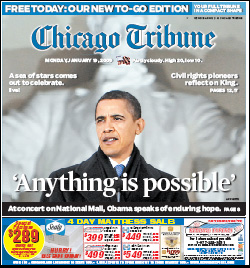Google CEO Eric Schmidt has been one of the most vocal supporters of newspaper among the ranks of the digerati, so it must hurt him to pull the plug on Google Print Ads. When it launched the program two years ago, Google hoped Print Ads would not only be a revenue stream but also a sincere effort to bridge the print/online gap and inject new life into newspapers’ traditional business. Unfortunately, “It is clear that the current Print Ads product is not the right solution,” wrote Spencer Spinnell, Director of Google Print Ads, in a blog entry, “so we are freeing up those resources to try to come up with new and innovative online solutions that will have a meaningful impact for users, advertisers and publishers.”
Print Ads was a variation of Google’s ad brokering system that enabled advertisers to bid on space in member newspapers. Google eventually amassed over 800 newspaper partners. The program differed from a bigger initiative by Yahoo because Google targeted print advertising directly. Yahoo’s newspaper partnerships are strictly online. Spinnell’s announcement was tinged with regret. “We believe fair and accurate journalism and timely news are critical ingredients to a healthy democracy,” he wrote. “We remain dedicated to working with publishers to develop new ways for them to earn money.”
Will Slim Bid for Times Co.?
 Now that Mexican billionaire Carlos Slim has loaned The New York Times Co. $250 million to meet its debt obligations, speculation is focusing on his motivations. With a personal fortune estimated at more than $60 billion, Slim is one of the world’s richest men. Buying the Times Co. would add a new chapter in his storied career investing in telecommunications, retailing, construction, banking, insurance, railroads and mining. Unlike Sam Zell, Slim could finance the Times Co. with pocket change, meaning he could own one of the world’s greatest media brands without the overhead of having to meet onerous financial terms. Alan Mutter suggests that Slim could parlay his investment into an outright takeover, something no other investor has been able to attempt because of the Ochs Sulzberger family’s tight control of the company. He notes that the comparatively shallow-pocketed Rupert Murdoch bought Dow Jones for a much higher price. “If Murdoch could swing $5 billion for Dow Jones with only $8 billion in personal net worth, then imagine how much Slim could afford to pay for a trophy like NYT,” Mutter writes.
Now that Mexican billionaire Carlos Slim has loaned The New York Times Co. $250 million to meet its debt obligations, speculation is focusing on his motivations. With a personal fortune estimated at more than $60 billion, Slim is one of the world’s richest men. Buying the Times Co. would add a new chapter in his storied career investing in telecommunications, retailing, construction, banking, insurance, railroads and mining. Unlike Sam Zell, Slim could finance the Times Co. with pocket change, meaning he could own one of the world’s greatest media brands without the overhead of having to meet onerous financial terms. Alan Mutter suggests that Slim could parlay his investment into an outright takeover, something no other investor has been able to attempt because of the Ochs Sulzberger family’s tight control of the company. He notes that the comparatively shallow-pocketed Rupert Murdoch bought Dow Jones for a much higher price. “If Murdoch could swing $5 billion for Dow Jones with only $8 billion in personal net worth, then imagine how much Slim could afford to pay for a trophy like NYT,” Mutter writes.
Journalism’s Distant Mirror
 Writing in The New Yorker, Jill Lepore reminds us that newspapers have been declared dead before. Her historical account begins in 1765 and takes us through the crucial role that newspapers played in colonial America by fanning public outrage against British – and later American – rule. The Stamp Act, passed by Parliament that year, was widely thought to be the death of newspapers, since it affixed a tax to every page printers produced. But resourceful publishers persevered, even moving their presses by boat under the cloak of night to evade government enforcers.
Writing in The New Yorker, Jill Lepore reminds us that newspapers have been declared dead before. Her historical account begins in 1765 and takes us through the crucial role that newspapers played in colonial America by fanning public outrage against British – and later American – rule. The Stamp Act, passed by Parliament that year, was widely thought to be the death of newspapers, since it affixed a tax to every page printers produced. But resourceful publishers persevered, even moving their presses by boat under the cloak of night to evade government enforcers.
Lepore notes that the concept of an impartial press is a relatively recent invention. “Because early newspapers tended to take aim at people in power, they were sometimes called ‘paper bullets,'” she writes. “Standards of journalistic objectivity date to the nineteenth century. Before then, the whole point was to have a point of view.” In fact, Benjamin Franklin, who could be considered the father of the American newspaper, didn’t see his role as being “to find out facts. It was to publish a sufficient range of opinion.” In that form, “Early American newspapers tend to look like one long and uninterrupted invective.”
This oppositional role didn’t just roil the British authorities. John Adams signed into law the Sedition Act in 1798, making it a crime to defame his administration. “Adams had come to consider printers a scourge,” Lepore writes. Adams’ successor, Thomas Jefferson, was an ardent supporter of a free press, but by the beginning of his second term, even Jefferson admitted to having thought about prosecuting some publishers.
While not framing the point explicitly, Lepore makes the case that partisan journalism of the kind practiced by bloggers isn’t necessarily a bad thing. Truth may be the casualty of unbridled opinion, but that was also the case in the 18th century, when even Sam Adams occasionally made up stories to dramatize British cruelty. The fact that some newspapers published untruths didn’t make them any less vital to the establishment of a fledgling democracy. “Without partisan and even scurrilous printers pushing the limits of a free press in the seventeen-nineties, [author] Marcus Daniel argues, the legitimacy of a loyal opposition never would have been established and the new nation, with its vigorous and democratizing political culture, might never have found its feet.”
We feel compelled to note again that Newspaper Death Watch is cited in the article’s opening paragraph, although we differ with the author’s characterization of our tone as gleeful. We prefer to think of it as bemused.
Miscellany
The LA Times is girding for more layoffs. Russ Newton, the Times‘ senior vice president of production, sent a letter to the Teamsters union, which shared it with its members. “The Los Angeles Times has decided to take steps to further reduce its cost including, but not limited to, layoffs,” Newton writes. “[T]he Company intends to implement the cutbacks no later than March 15th, 2009.”
Romenesko reports that Gannett newspaper boss Bob Dickey’s decision to fly from Virginia to Arizona to announce plans to sell the Tucson Citizen wasn’t entirely altruistic. In fact, Arizona appears to have been just a waypoint on a trip further west. Dickey is in Palm Beach, Calif. this week for the Bob Hope Chrysler Classic golf tournament.
 Editor & Publisher‘s Mark Fitzgerald reviews the redesigned Chicago Tribune and pronounces it a “home run.” With its clean look, lack of jumps and liberal use of info graphics, the “to-go” edition of the Trib, which will only be sold on newsstands, “eloquently makes the argument that it’s time America’s big-city dailies seriously consider converting to a compact format,” Fitzgerald writes. The question is when the Tribune will simplify things and make the tabloid edition available to home subscribers, too.
Editor & Publisher‘s Mark Fitzgerald reviews the redesigned Chicago Tribune and pronounces it a “home run.” With its clean look, lack of jumps and liberal use of info graphics, the “to-go” edition of the Trib, which will only be sold on newsstands, “eloquently makes the argument that it’s time America’s big-city dailies seriously consider converting to a compact format,” Fitzgerald writes. The question is when the Tribune will simplify things and make the tabloid edition available to home subscribers, too.
Lee Enterprises reported a 69.3% decline in first-quarter profits as revenues dropped 13%. The company said it is further cutting costs and will ask shareholders to authorize a reverse stock split to comply with the minimum bid price requirement of the New York Stock Exchange listing standards, if necessary. In an unrelated move, the publisher of the Lee-owned Wisconsin State Journal and Madison Capital Times said it will cut 12 positions, mostly in editorial.
The World Association of Newspapers will postpone its annual congress because of the global economic crisis. The meeting was set to take place in Hyderabad, India in March, but only 250 delegates have signed up so far. That’s well below the 1,500 who usually attend.
Last summer we told you about Neighborsgo.com, a spinoff of the Dallas Morning News that uses a social network to anchor a community journalism initiative. Apparently it’s working. Editor & Publisher reports that Neighborsgo is being expanded to cover 47 neighborhoods, with each section featuring headlines, local restaurants, gas prices, education resources and crime news.
Media malaise continues to spread beyond the newspaper industry. Warner Bros. Entertainment is cutting its global workforce by 10% by laying off 600 people and leaving 200 vacant positions unfilled. Clear Channel Communications, which is another diversified media company, announced plans to idle 1,850 workers last week.
Hearst Corp. has officially notified employees of the Seattle Post-Intelligencer that they will all lose their jobs if no one buys the newspaper. This may have seemed obvious following last week’s announcement that the paper will be shuttered if a buyer isn’t found, but Hearst had to send a letter as a formality. A few people might be offered jobs at SeattlePI.com if the publisher elects to keep the website alive.
And Finally…
Here’s one to satisfy your inner voyeur. Nicholas White was trapped in an elevator in New York City’s McGraw-Hill building for 41 hours. It was a lonely ordeal, but White unknowingly had a security camera to keep him company. His plight is documented in a time-lapse video that condenses 41 hours to just a few minutes set to mournful music.
Comments
This entry was posted on Wednesday, January 21st, 2009 at 9:10 am and is filed under Facebook, Fake News, Google, Hyper-local, Solutions. You can follow any responses to this entry through the RSS 2.0 feed. Both comments and pings are currently closed.



I think big money makers like Slim could help the newspaper industry, allowing a newspaper to work without the stockholder pressure. That’s why I think the really big newspapers will survive with solo owners, but Slim obviously wouldn’t want the rest of the NYT newspapers, like the New England division. That would just be throwing money away. But the NYT likely won’t sell just the Times, they would want to unload the entire company.
I found an interesting analogy for what google is doing, In Real Life Game of Survivor: Google Has Immunity and Newspapers are Voted Off
Really how long will print last?